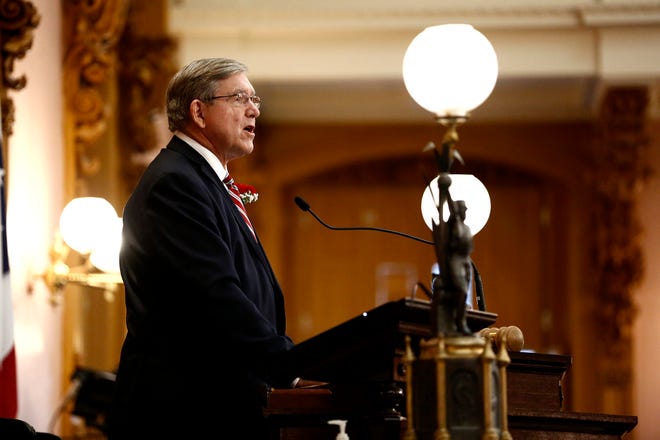

Ohio Republicans passed a bill Wednesday let state lawmakers change or revoke the state's public health orders over the objections of Democrats and Gov. Mike DeWine.
"The most important decisions of the past year were all out of ours hands," Rep. Scott Wiggam, R-Wooster, said. "Shutting down businesses. Telling people you are essential and not essential. Whether or not a mask mandate needs to continue. Those are pretty big decisions, and one person has made those."
Senate Bill 22, which passed through both the House and Senate on party-line votes, would change that by giving state lawmakers the power to rescind or change public health orders issued by any state agency.
But both chambers may need to vote again to make the bill a law. DeWine said he would veto a previous version of the bill, calling it a "grave mistake" to tie the hands of a future governor. He declined through a spokesman to comment on the revised bill Wednesday.
Here's how the bill would work:
- Any state of emergency order would expire after 90 days unless lawmakers voted to extend it in 60-day increments.
- Lawmakers could terminate the emergency after 30 days.
- Creates the Ohio Health Oversight and Advisory Committee with equal members from both chambers.
- Bans local boards of health from closing schools, issuing orders for specific types of businesses (i.e. shutting down gyms) or prohibiting public gatherings.
- Lets people sue the state on the constitutionality of any order in their county of residence and pays them attorney fees if they win.
What this means, Wiggam said, is that Franklin County couldn't decide to issue its own mask mandate if the General Assembly rescinded a statewide order.
"That’s the purpose of that portion of it," he said. "We focused their power and authority in pandemic situations on quarantining and isolating."
That troubled House Democrats like Rep. Brigid Kelly, D-Cincinnati, because Ohio's counties have had dramatically different transmission rates throughout the COVID-19 pandemic.
"If we are going to be working on something like this that is very consequential in ways people understand and don’t understand then it deserves more than two hearings," Kelly said after the substitute bill passed out of committee Tuesday night.
There's also a clear ideological difference between Ohio Republicans and Democrats on whether this amount of legislative oversight would hinder a governor and possibly cost lives during a pandemic.
"I think there is this misconception in how this is being cast that if we allow the legislature to have any role in health orders, the result will be we will have no health orders," Rep. Brian Stewart, R-Ashville, said. "I think that's wrong. There were many orders issues during this pandemic that we have no issues with."
Republicans had enough votes in the Senate to override a veto but were a few short in the House, though there were enough Republicans absent to get to the necessary 60 votes. The House wasn't able to put together the votes to veto previous health order bills.
Senate President Matt Huffman, R-Lima, said he would schedule an override vote as soon as possible if DeWine vetoes the bill.
Source link









